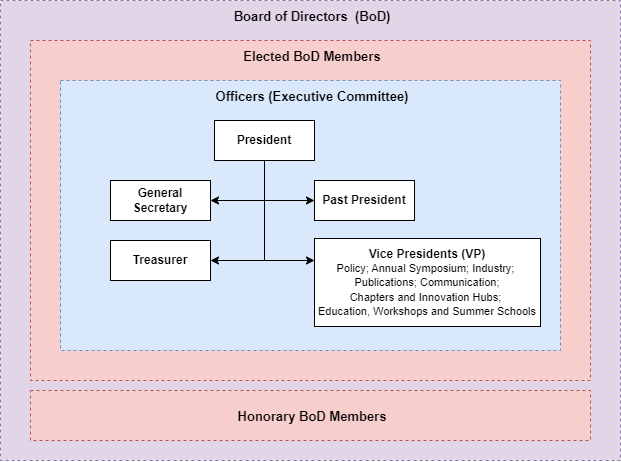Organization of IAARC
IAARC is a not-for-profit-organization (NPO) that uses its membership dues to develop services for, and facilitate and maintain communication between its members. IAARC is managed by its board whose directors and presidency continually change. The dynamic nature of the Association ensures that fresh ideas are brought into the organization whilst benefiting from the experience of others.
The organizational structure of IAARC Board of Directors (BOD) is:

The Board of Directors (BOD) meets annually during the ISARC symposium and has some virtual meetings throughout the remainder of the year. The members of IAARC’s Executive Committee are the President, the Vice-Presidents, the Past President, the General Secretary, and the Treasurer. Their activities involve: take responsibility for the association; approach new members; initiate and prepare board meetings; create reports for the annual BOD-meeting, i.e. membership status, financial statement and the budget for the coming years. IAARC awards Honorary Lifetime Board of Directors Membership to distinguished individuals who have demonstrated outstanding leadership, service, and impact within the association and our broader community. The full criteria are available in the IAARC Honorary Lifetime Membership document here. To nominate a colleague, please contact the IAARC General Secretary. The constitution of IAARC can be found here.
President
| Ioannis | Brilakis | Cambridge University | United Kingdom |
Vice-Presidents
| Policy / Past President | Hyoungkwan | Kim | Yonsei University | Republic of Korea |
| Publications | Vineet | Kamat | University of Michigan | USA |
| Annual Symposium | Yong | Cho | Georgia Institute of Technology | USA |
| Chapters and Innovation Hubs | Ram Kumar | Mantha | University of Sharjah | UAE |
| Education, Workshops and Summer School | Shabtai | Isaac | Ben-Gurion University of the Negev | Israel |
| Communication | Yelda | Turkan | Oregan State University | USA |
| Industry | TBC |
General Secretary
| Borja | Garcia de Soto | NYU Abu Dhabi | UAE |
Treasurer
| Johnson Xuesong | Shen | UNSW Sydney | Australia |
Elected BOD Members
| Mohamed | Al-Hussein | University of Alberta | Canada |
| Mehrdad | Arashpour | Monash University | Australia |
| Thomas | Bock | Technical University Munich | Germany |
| Frederic | Bosche | University of Edinburgh | United Kingdom |
| Alexey | Bulgakov | Ministy of education and science of Russian federation | Russia |
| Alessandro | Carbonari | Università politecnica delle marche Ancona | Italy |
| Daniel | Castro-Lacouture | Purdue University | USA |
| Po-Han | Chen | Concordia University | Canada |
| Qian | Chen | University of British Columbia | Canada |
| Chen | Feng | New York University | USA |
| Vicente | Gonzalez | University of Alberta | Canada |
| Daniel | Hall | TU Delft | Netherlands |
| Amin | Hammad | Concordia University | Canada |
| Rauno | Heikkilä | University of Oulu | Finland |
| Rongbo | Hu | Kajima Corporation | Singapore |
| Javier | Irizarry | Georgia Institute of Technology | USA |
| Kepa | Iturralde | Technical University Munich | Germany |
| Markus | Kőnig | Ruhr-University Bochum | Germany |
| Soonwook | Kwon | Sungkyunkwan University | Republic of Korea |
| Zoubeir | Lafhaj | EC Lille | France |
| Nan | Li | Tsinghua University | China |
| Thomas | Linner | Ostbayerische Technische Hochschule Regensburg | Germany |
| Joseph | Louis | Oregon State University | USA |
| Ming Shan (Charmaine) | Ng | Kyoto Institute of Technology | Japan |
| Wei | Pan | University of Hong Kong | Hong Kong |
| Benny | Raphael | IIT Madras | India |
| Saiedeh | Razavi | McMaster University | Canada |
| Jochen | Teizer | Technical University of Denmark (DTU) | Denmark |
| Józef | Wrona | Łukasiewicz Research Network – Industrial Research Institute for Automation and Measurements PIAP | Poland |
| Jiansong | Zhang | Purdue University | USA |
| Zhenhua | Zhu | University of Wisconsin | USA |
| Yang | Zou | University of Auckland | New Zealand |
Honorary BOD Members
| Carl T. | Haas | University of Waterloo | Canada |
| Yukio | Hasegawa (In Memoriam) | Waseda University – Tokyo | Japan |
| Ronie | Navon | Technion – Israel Institute of Technology | Israel |
| Miroslaw | Skibniewski | University of Maryland | USA |
| Richard L. | Tucker | The University of Texas at Austin | USA |
